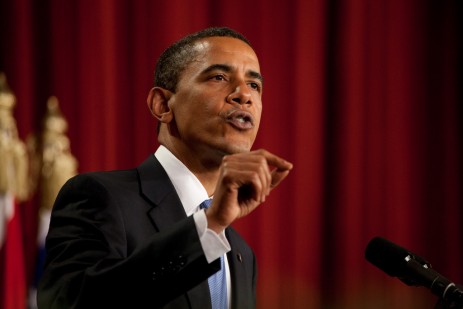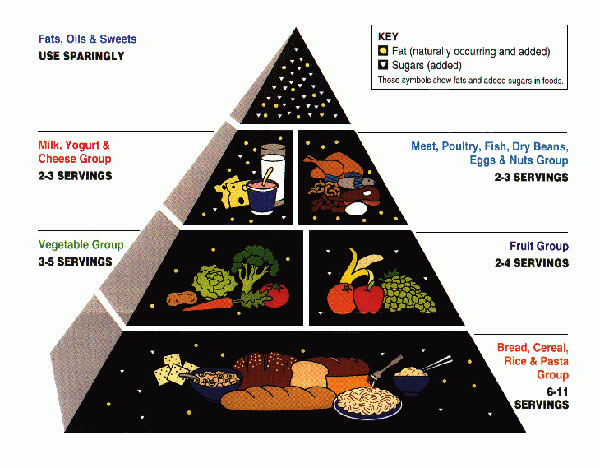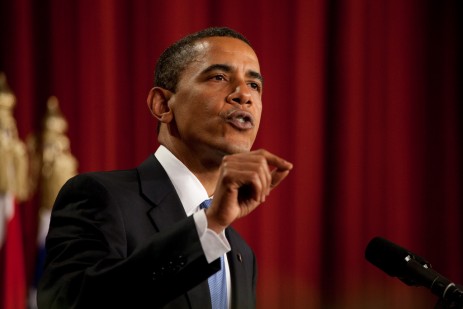 In a response to my call here at Grist for environmentalists to explore, after the midterms, a primary challenger to President Obama, the usually sage David Roberts wonders:
In a response to my call here at Grist for environmentalists to explore, after the midterms, a primary challenger to President Obama, the usually sage David Roberts wonders:
Should environmentalists run a purely vindictive campaign the only “success” of which could be to unseat a president who has achieved more for progressives in the past two years than any president since Nixon?
Tell that to progressives. My original post was entitled “Environmentalists need a new president,” but could easily have been “Workers need a new president,” “Gays need a new president,” and on and on. Obama’s stimulus didn’t create enough jobs (h/t Paul Krugman), he failed to push Congress protect workers’ right to form a union, and he continues to refuse to allow gays and lesbians to serve openly in the military, dealing a serious blow to progressive efforts for equality.
Meanwhile, as Jane Hamsher writes, major progressive donors like George Soros and Peter Lewis are closing their wallets to Democrats, frustrated by the White House’s attacks on the “professional left” (i.e. the ones who fund and volunteer on their campaigns) and their consistent adoption of the conservative meta-narrative:
So, let’s see if I have this straight. After the unions put hundreds of millions into getting Obama elected, and they get played on EFCA, the Democrats lay the blame off on ConservaDem Senators like Blanche Lincoln. So the unions spend $10 million trying to send a message to Lincoln, working within the Democratic party to support a primary opponent.
When Lincoln wins, “senior White House officials” are instantly calling journalists to taunt the unions as “absolute idiots” who “just flushed $10 million of their members’ money down the toilet on a pointless exercise.”
Rather than building up a progressive movement and progressive America, Obama has demoralized his friends and emboldened his enemies.
Or as Arianna Huffington put it this week on her appearance with Rachel Maddow:
Maybe progressives and the middle class need to sort of face up to the fact that the president is not that much into them, that he would rather hang out with Larry Summers, or flirt with Olympia Snowe, or play wargames late into the night with General Petraeus.
Of course, Obama apologists respond by citing some of Obama’s accomplishments — without questioning if they were adequate or if they are even remotely close to what Obama could have achieved had he not been so wary of taking on the Republicans. We must always remember that politics is the art of the possible — and it’s hard to contend that Obama has achieved anything close to what was possible with enormous Democratic majorities and having entered office facing a discredited opposition and with enormous enthusiasm at his back.
But David raises a deeper challenge to the movement, asking if saving the planet shouldn’t be subordinated to other goals. In other words, what do an oil spill and a baking planet matter if you pass a big health care bill and other items on the White House agenda?
To me, it’s a false choice (as David himself suggests toward the end of his post). No matter how many health care bills are passed or how many economic stimulus programs implemented, it will be impossible to create an America in which people are healthy, well-educated, and there’s broadly shared prosperity if we don’t save a planet in peril and create a truly green economy.
The health care bill is one example. Although it’s likely to deliver health benefits, those will be limited compared to the reduced deaths that come from switching away from polluting sources of energy that kill 24,000 people a year from lung cancer, heart attacks, and other causes. In Doctor Planet, an article I co-authored with Dr. Rahul Rajkumar, a leading health policy thinker, we wrote:
Lack of access to health care is a moral imperative — but inadequate health care is responsible for only a small fraction of the unnecessary loss of life that occurs every year in this country. If the goal is to make Americans live longer, healthier lives while reducing the burden out-of-control health care costs impose on families tight budgets, we need to realize that Mother Nature may be the best doctor of all. In some ways, the real health bill now working its way through Congress is the energy and climate bill. It could bring cleaner air and water — and reduce our reliance on oil and other fossil fuels.
Beyond the health benefits, America faces the real risk of being left behind in the 21st Century if we don’t seriously ramp up efforts to create the green economy. That’s why unions like the AFL-CIO, United Steelworkers, SEIU, Communications Workers, Laborers International, United Autoworkers, American Federation of Teachers, Transit Union, as well as civil rights groups like the NAACP have pushed so hard alongside environmentalists for strong clean energy and climate legislation.
Protecting the environment can also bring peace to America and the world: With our energy produced at home, we won’t have to spend billions of dollars and thousands of lives defending our faraway oil supply — or contend with the destabilization causes by millions of environmental refugees. As Wangari Maathai’s Green Belt Movement has shown, simple green acts like planting trees can be a powerful force for the empowerment and education of women.
Finally, clean energy can create a fundamental political shift, stopping the flow of hard earned American dollars into the hands of oil billionaires like the Koch brothers, who turn around and use that cash to corrupt our political system and fight the broad progressive agenda.
It’s for all these reasons that so many progressives have embraced the fight for a safe climate and a green economy. Indeed, the environment is probably the ultimate progressive issue, uniting progressives more than any other — exactly because it makes the just, peaceful, and prosperous America progressives believe in possible.



